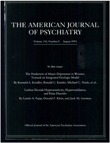Neurasthenia and chronic fatigue syndrome: the role of culture in the making of a diagnosis
Abstract
Chronic fatigue syndrome is an increasingly popular diagnosis consisting of multiple psychiatric and somatic symptoms. It bears a striking resemblance to the nineteenth-century diagnosis of neurasthenia. Both disorders arose during periods characterized by a preoccupation with commerce and material success and major changes in the role of women. They illustrate the role of culture in the development of a new diagnosis that emphasizes a "medical" rather than "psychiatric" etiology. The authors argue that chronic fatigue syndrome will meet the same fate as neurasthenia--a decline in social value as it is demonstrated that the majority of its sufferers are experiencing primary psychiatric disorders or psychophysiological reactions and that the disorder is often a culturally sanctioned form of illness behavior.
Access content
To read the fulltext, please use one of the options below to sign in or purchase access.- Personal login
- Institutional Login
- Sign in via OpenAthens
- Register for access
-
Please login/register if you wish to pair your device and check access availability.
Not a subscriber?
PsychiatryOnline subscription options offer access to the DSM-5 library, books, journals, CME, and patient resources. This all-in-one virtual library provides psychiatrists and mental health professionals with key resources for diagnosis, treatment, research, and professional development.
Need more help? PsychiatryOnline Customer Service may be reached by emailing [email protected] or by calling 800-368-5777 (in the U.S.) or 703-907-7322 (outside the U.S.).



